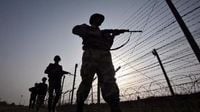On the evening of September 20, 2025, the fragile calm along the Line of Control (LoC) in Jammu and Kashmir was briefly shattered as Indian and Pakistani troops exchanged small arms fire in the Nowgam sector of Kupwara district. According to reports from News18 and India Today, the incident began around 6:15 pm and continued intermittently for nearly an hour before both sides ceased firing. Despite the tension, no injuries were reported, and army sources on both sides were quick to clarify that the incident did not amount to a ceasefire violation.
Army sources told News18 that the exchange involved four rounds of small arms fire from the Pakistani side, prompting a response of nearly twenty rounds from Indian troops. The situation was kept under control, they said, and was closely monitored throughout the episode. As of September 21, the Indian Army had not issued an official statement regarding the incident, leaving room for speculation but also for restraint—an important detail, given the region’s volatile history.
This latest exchange comes at a particularly sensitive time, just one day before the much-anticipated Super Fours match between India and Pakistan for the Asia Cup 2025 in Dubai. While cricket often serves as a unifying force—or at least a welcome distraction—between the two nations, the proximity of these two events underscores the persistent undercurrent of tension along the border.
For those tracking the security situation in Jammu and Kashmir, the Nowgam incident is not an isolated event. It follows weeks after the Indian Army reportedly foiled an infiltration attempt in the Balakot sector of Poonch district on September 1, 2025. That operation, according to News18, led to an exchange of fire but successfully prevented suspected infiltrators from crossing into Indian territory. Since then, surveillance and patrolling in the area have been stepped up, with both sides remaining vigilant for further attempts.
Despite these occasional flare-ups, the LoC has largely remained calm since the February 2021 ceasefire agreement. However, as India Today points out, sporadic instances of cross-border firing and infiltration bids continue to test the durability of that truce. The Indian Army, for its part, has repeatedly emphasized that not every exchange of fire constitutes a violation of the ceasefire, a distinction that seems to matter more than ever as both sides navigate the delicate balance between deterrence and escalation.
To add to the complexity, the recent Nowgam exchange is set against the backdrop of Operation Sindoor, a significant military operation that unfolded just months earlier. On May 7, 2025, India launched Operation Sindoor targeting what it described as Pakistani terror infrastructure, in direct retaliation for the Pahalgam terror attack that claimed 26 lives. The four-day conflict, which ended swiftly on May 10, saw several airbases and nine terror launch pads destroyed in Pakistan, according to India Today. Remarkably, India reported no notable damage on its side during the operation.
The quick conclusion of Operation Sindoor, and the measured response to subsequent incidents, reflect a broader strategy of limited engagement. Air Chief Marshal AP Singh, speaking at an event for Air Force veterans on September 20, 2025, explained the rationale behind this approach: "We stopped the war very quickly. Yes, they were on the back foot, no doubt, but what were our objectives? Our objective was anti-terrorism. We had to strike them. We had done that. So if our objectives have been met, then why should we not terminate a conflict? Why should we carry on? Because any conflict has a lot of price which has to be paid."
His remarks, as reported by India Today, offer a candid glimpse into the calculus driving India’s recent military actions—achieve the objective, avoid unnecessary escalation, and minimize the human and material costs of conflict. It’s a sentiment that resonates with many on both sides of the border, even as hardliners continue to demand a more forceful response to perceived provocations.
The aftermath of Operation Sindoor also saw a flurry of reports about alleged ceasefire violations. On August 5, 2025, for example, some media outlets claimed that Pakistani forces had breached the ceasefire in the Poonch region. However, the Indian Army was quick to issue a clarification, stating: "There have been some media and social media reports regarding ceasefire violation in Poonch region. It is clarified that there has been NO ceasefire violation along the Line of Control. Please avoid spreading unverified information." This official denial highlights the challenges of information warfare and the importance of credible, verified reporting in a region where rumors can quickly spiral into crisis.
While the LoC has been mostly peaceful since the 2021 agreement, these recent incidents serve as reminders of just how precarious that peace can be. Each exchange of fire, each infiltration bid, and each military operation carries with it the risk of escalation, miscalculation, or worse. Yet, as the events of September 20 demonstrate, both sides appear—at least for now—committed to managing these risks through restraint and communication, rather than open conflict.
For residents of Kupwara, Poonch, and other border districts, these exchanges are more than just headlines; they are lived realities that shape daily life, from the rhythms of farming and schooling to the ever-present anxiety of sudden violence. The absence of casualties in the latest incident is a small mercy, but the underlying tensions remain unresolved.
Looking ahead, the challenge for both India and Pakistan will be to maintain the fragile peace along the LoC while addressing the root causes of conflict—whether terrorism, territorial disputes, or political mistrust. As the cricket teams face off in Dubai, perhaps there’s hope that dialogue, competition, and even a bit of sportsmanship can help ease the animosities that have plagued the region for decades.
For now, the guns in Nowgam are silent, and both nations watch and wait—hoping that the next exchange will be of words, not bullets.




